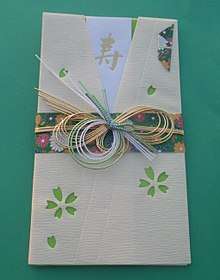Shūgi-bukuro
A shūgi-bukuro (祝儀袋) is a special envelope in which money is given as a gift of celebration in Japan, especially at weddings.[1]

It is very common in Japan to give a gift of money at weddings. The giver inserts the money into a shūgi-bukuro on which they have written their name. The shūgi-bukuro is handed to the receptionist of the reception party. Shūgi-bukuro are sold at supermarkets and stationery stores.
Amount given
The amount given in shūgi-bukuro differs according to the givers relationship to the couple, their social status and the style of venue. In the case of friends or company colleagues, it is usually between ¥20,000 and ¥30,000. In the case of close friends or those in a senior position at the bride or bridegroom's company, ¥30,000 to ¥50,000 is common, and in the case of relatives, ¥50,000 to ¥100,000 is not unusual.
For married couples that attend the wedding ¥50,000 would be common, as opposed to unmarried couples where each person would give a separate amount say ¥30,000 each.
It is common to give amounts in which the leading digits form an odd number, such as ¥10,000 or ¥30,000, in order to symbolize the fact that the newly married couple cannot be divided. When the leading digit forms an even number, as in ¥20,000, the amount is usually given in an odd number of bills (e.g. 1 × ¥10,000 and 2 × ¥5,000). Amounts in which the leading digit forms a multiple of 4, such as ¥40,000, are not recommended since the number 4 in Japanese can be pronounced as shi which is the same as the pronunciation of the Japanese word for death. Likewise, multiples of 9 are avoided because the pronunciation of this number ku can mean suffering.
See also
- Washi, Japanese paper, used to make the Shūgi-bukuro envelopes.
- Mizuhiki, decorative cords wrapped-around Shūgi-bukuro envelopes.
- Otoshidama, Japanese New-Year gift.
- Kōden-bukuro, envelope for condolence money offered at Japanese funerals.
- Red envelope, or pinyin: Hóngbāo, the Chinese equivalent.
- Origami
- Origata
References
- Gordenker, Alice (2011-06-21). "Kinpū". The Japan Times. Retrieved 2020-03-25. (Kinpū (金封, Envelope of money))